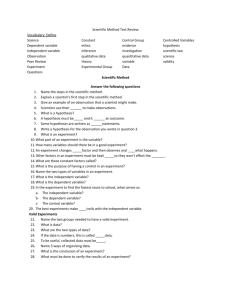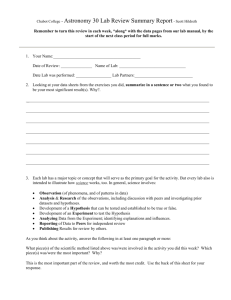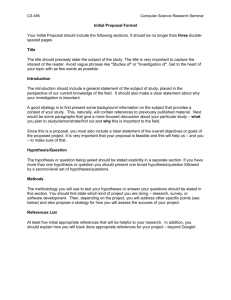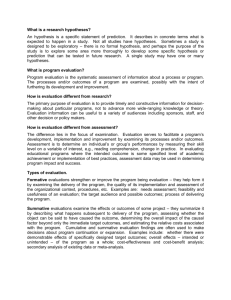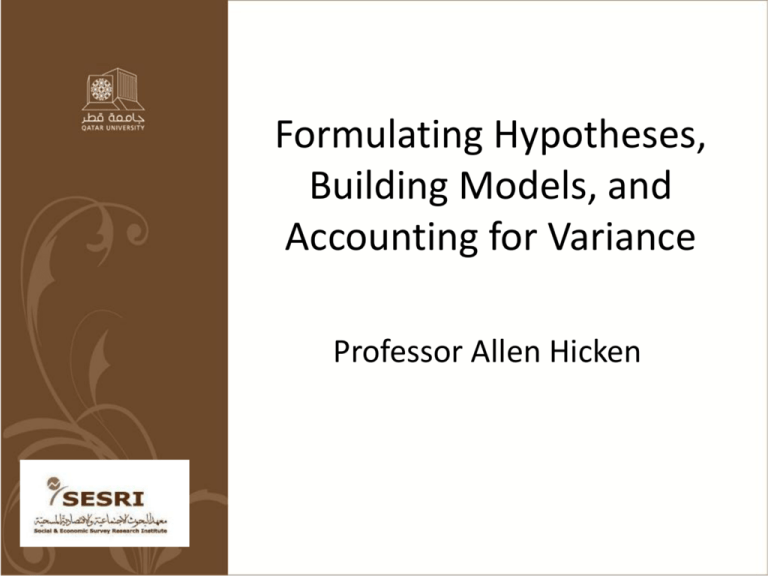
Formulating Hypotheses,
Building Models, and
Accounting for Variance
Professor Allen Hicken
“The wrong view of science betrays itself in the
craving to be right; for it is not his possession of
knowledge, of irrefutable truth, that makes the
man of science, but his persistent and recklessly
critical quest for truth.”
Sir Karl Popper (2003 [1959]: 281)
Openness
Criticism
Scientific Method
1.
2.
3.
4.
5.
Puzzle/Question
Theory/Model
Implications/Hypotheses
Observe the world (test hypotheses)
Evaluation
Scientific Method
1. Puzzle/Question
–
–
–
Eureka!
What? Why? How?
Existing theories of how the world works
Scientific Method
1. Puzzle/Question
2. Theory/Model
–
Simplicity/Parsimony
Scientific Method
1. Puzzle/Question
2. Theory/Model
–
–
–
Simplicity/Parsimony
Predictive Accuracy
Importance
•
•
•
Does it address a pressing problem?
How does it affect pre-existing theory?
Is it generalizable?
Scientific Method
1. Puzzle/Question
2. Theory/Model
3. Implications/Hypotheses
–
Implications of theory other than what we
have already observed
Hypothesis Definition
• A testable statement about the empirical
relationship between an independent and a
dependent variable. (Pollock 2009)
Hypothesis Design
1: Identify both an independent (cause) and
dependent (effect) variable
– Example: Some students perform better on exams
than others
– Fix: Students who sit near the front of the class
perform better on exams than students who sit
near the back
Hypothesis Design
2: Make an explicit comparison
– Example: Rural residents are more likely to be
religious
– Fix: Compared to residents in urban areas of the
country rural residents are more likely to be
religious
Hypothesis Design
3: State the nature of the relationship
– Example: In a comparison of countries, female
education attainment and infant mortality are
related
– Fix: In a comparison of countries, female
education attainment is negatively related to
infant mortality
Hypothesis Design
4: Be specific
– Example: Differences among immigrants account
for different incomes.
– Fix: In a comparison of immigrants in Qatar,
individuals with higher levels of English proficiency
are likely to have higher incomes than those with
lower levels of proficiency.
Hypothesis Design
5: Be sure it is testable/falsifiable
– Example: Strong states are able to overcome
special interests in order to implement policies
that are best for the nation
– Example: Those who value education are more
likely to attend school.
– Fix: In a comparison of students in Qatar
individuals with more positive attitudes about
school perform better than those with negative
attitudes.
Hypothesis Template
In a comparison of [units of analysis], those
having [one value on the independent variable]
will be more likely to have [one value on the
dependent variable] than will those having [a
different value on the independent variable].
(Pollock 2009)
Exercise I
1) Identify and describe at least one reason why each
statement is a poor hypothesis. 2) Rewrite the
statement as a proper hypothesis.
A. In a comparison of individuals, some people will be
more likely to have served in the military than other
people will
B. Decentralized workplaces have highly satisfied
workers
C. Education and smoking are related
D. Some people support increased funding for religious
education
Scientific Method
1.
2.
3.
4.
Puzzle/Question
Theory/Model
Implications/Hypotheses
Observe the world (test hypotheses)
Concept
Variable
Indicator
Operationalization
Defining Concepts
• Concepts
– Must be concrete (measurable)
– Must vary
• Conceptual Definition must communicate:
1. The variation within a measurable characteristic
or set of characteristics
2. The subjects or groups to which the concept
applies
3. How the characteristic is to be measured
Defining Concepts
• Example
The concept of wealth is defined as…
–
–
–
–
–
–
–
a person’s yearly income
a household’s yearly income
how rich a person is
the number of household employees
the number of household vehicles a household owns
a household’s lifestyle
the number of residences a household owns
Problems of Measurement
1. Accuracy
Concept
A
Theory
?
Measure
A
Concept
B
?
Observed
Relationship
Measure
B
Problems of Measurement
Education is
associated with
income
1. Accuracy
Concept
Concept
Education
Income
?
Measure
Degree
?
Degree has no
relationship to
family income
Measure
Household
Income
Exercise II
• Think about a possible relationship in your
area of research.
1. Write a testable hypothesis for this
relationship
2. How would you define your key concepts?
(Write a conceptual definition for each)
3. What are some measures you might use as a
proxy for your concept?
Sources
• Clark, Golder and Golder. 2008. Principles of
Comparative Politics. CQ Press.
• Philip H. Pollock III. 2009. The Essentials of
Political Analysis. CQ Press.
• W. Philips Shively. The Craft of Political
Research. Pearson Prentice Hall.




